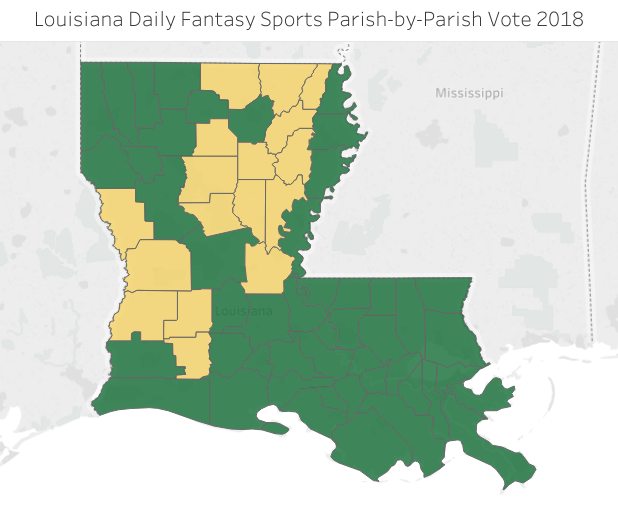By Jacqueline DeRobertis and Dwayne Hinton
LSU Manship School News Service
Louisianans voted Tuesday to legalize daily fantasy sports contests in 47 out of 64 parishes, suggesting a significant increase in support for gaming since the 1990s.
Back then, only 31 parishes voted to allow video poker. But this week, 18 parishes that had voted against video poker flipped to support fantasy sports, while two flipped the other way.
Statewide, the share of voters who supported fantasy sports is seven percentage points higher than the share that supported video poker.
Polling expert Michael Henderson said that the biggest increases in favorable votes can be found in metro areas across south Louisiana, including Orleans, Jefferson, St. Tammany, East Baton Rouge, Lafayette and Ascension parishes.
The majority of “no” parishes still reside in the northern and central regions of the state.
However, the final tally indicates that some formerly anti-gaming areas of the state have revised their thinking, including Rapides Parish, which contains Alexandria, and Ouachita Parish, which contains Monroe.
Natchitoches and Concordia parishes in central Louisiana and Claiborne, Lincoln and Bienville parishes in the north also shifted their attitudes in support of daily fantasy sports. Nevertheless, the biggest gains can be found in the South.
“Most of the flips from opposed to support are concentrated in the southern part of the state,” Henderson, the director of LSU’s Public Policy Research Lab, said.
These southern parishes include Ascension, East Baton Rouge, East Feliciana, Vermilion, Lafayette, Iberia, St. Tammany, Tangipahoa, Evangeline, Livingston and Washington.
Only Avoyelles Parish in the central area of the state and Jefferson Davis Parish in the south reversed their position from video poker to daily fantasy sports.
Seen by some as a “test balloon” vote to gauge gaming sentiment statewide, the ballot measure has drawn opposition from conservative groups like the Louisiana Family Forum that fear approval will open the door to betting on real sports.
Since a legalization ruling by the U.S. Supreme Court in May, Mississippi and other states have begun to generate revenue from betting on real sports, leaving gaming proponents in the Legislature concerned Louisiana is missing out on a new funding stream.
“The advocates of full-scale sports gambling will use this as rationale that the people of Louisiana want it,” said Kathleen Benfield, legislative director of Family Forum.
Daily fantasy sports – which involves creating sports teams on apps and betting against other contestants’ teams – “is not something that everyone would necessarily understand what it is.”
“In many parishes, it was very close – it was 50, 49,” Benfield added. “It wasn’t overwhelming, but it’s overwhelming the number of parishes that did vote for it.”
Benfield also remains skeptical of proposed safeguards in the bill that would allegedly prevent the apps from working across parish lines that have not approved the referendum. She hopes these geo-fencing technologies are “bulletproof.”
While Louisiana residents have long engaged in fantasy sports informally, players in parishes that have approved the ballot measure now have the chance to place bets for cash prizes on fantasy sports apps like DraftKings and FanDuel. From the NFL to the NBA, users will have opportunities to play for more money, more frequently, in a larger pool of contestants worldwide.
Pushed by gaming advocates as a fun way to get the most out of the football season and vilified by gaming opponents as a possible pathway to addiction, the measure rallied sports enthusiasts statewide in the week leading up to Tuesday’s vote.
DraftKings and FanDuel sank a combined $1 million into the pro-fantasy sports group, Fairness for Fantasy Sports in Louisiana, which sprang up in late August. Through a coordinated ad blitz, the group targeted sports fans who already play fantasy sports in local leagues with friends.
The ads failed to mention that playing fantasy sports is legal in Louisiana, but betting on fantasy sports is not. LFF, on the other hand, did not utilize any paid media to fight the measure and instead communicated with supporters through email and newsletters.
Fairness for Fantasy Sports also avoided the fuzzy problems of taxation and regulation. While fantasy sports apps are played in 41 states, the apps are only regulated in 19 states. Many proponents of DFS have argued that the apps would bring further gaming revenue to the state.
However, no one knows exactly how much money the apps could bring to the state at this point.
So far, most the 19 states that regulate the apps have created licensing fees, often ranging from $5,000 to $50,000 a year, according to a report by the National Conference of State Legislatures. Eleven of them are tax revenues, mostly between six percent and 15 percent of what is generated in the state.
“Those who believe taxing daily fantasy sports companies will create meaningful revenue for their budgets may be in for a rude awakening,” the report added. “While over 59 million people play, the number of people playing paid-entry daily fantasy sports is much smaller. In addition, the revenue that is taxed is only a fraction of the ‘handle’-the amount operators collect in entry fees.”
The author of the bill, Rep. Kirk Talbot, R-River Ridge, said he will create a bill in the spring to cover regulation and taxation of the apps.
“We’ll either do a percentage of the sales, or a flat fee, or a combination of the two,” Talbot said. “We’ll see which one is best for Louisiana and go from there.”
Fantasy sports fans will have to wait to place their bets until the state determines how to tax and regulate the apps.

Courtesy of Abbie Shull/LSU Manship School News Service

Courtesy of Abbie Shull/LSU Manship School News Service


